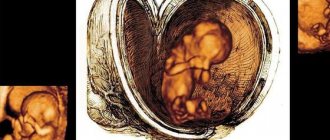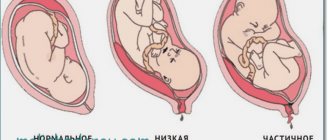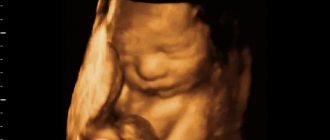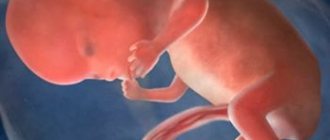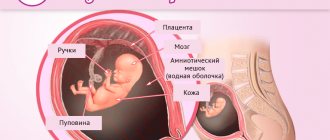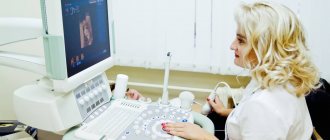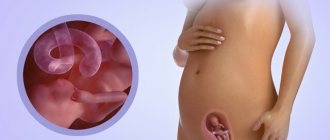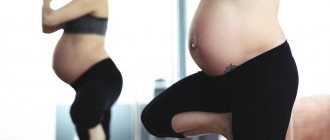What happens in the female body at 17 weeks?
In the fifth obstetric month of pregnancy, the uterus and the fetus inside it grow at an incredibly fast pace. The woman’s cardiovascular system works intensively, as the blood volume has increased significantly due to the placenta being saturated with blood vessels. A rapid heartbeat may be a manifestation of the active work of this organ, which conducts nutrients to the fetus. The fragility of blood vessels due to the increased load on their walls sometimes leads to nosebleeds.
An increase in the total volume of fluid in a pregnant woman’s body affects the volume of vaginal discharge and causes increased sweating. Careful adherence to personal hygiene rules can protect a woman from negative feelings.
A belly that is too small is not a cause for concern, the main thing is that the baby’s heartbeat is clear and audible.
17,18,19,20 weeks of pregnancy: what happens, development of pregnancy and fetus
- home
- Services and prices
- Services and prices
- About Us
- Doctors
- Schedule and online registration
- Reviews
- Doctor training
- Clinic addresses
- Blog
- CIropedia
Week by week 17 - 20 weeks of pregnancy Elena Gevorkova Obstetrician-gynecologist, Moscow
Week 17
BABY
The body length of the fetus at this stage is 12-13 cm, and its weight reaches 150 g by the end of the 17th week.
The main process of this week is to build up the baby's muscle mass. Various muscle groups are strengthened, which is manifested by increased motor activity of the fetus. Movements become more varied and complex. Frequent movements of the arms and legs not only train the muscles, but also contribute to the development of joints - knees and elbows. The arms are clenched into fists and unclenched infrequently - to grasp the umbilical cord or when sucking a finger. Before this period, the fetal head practically did not move, it was lowered low, the chin was pressed tightly to the chest. By the 17th week, the muscles of the back and neck are so strong that the fetal head can rise to an almost vertical position.
All internal organs continue to improve, their structure becomes more complex, and their functional abilities expand. In other words, intensive preparation continues, allowing the internal organs to begin full-fledged work immediately after the birth of the child.
Important changes occur in the baby's cardiovascular system. Around the heart there are many nerve plexuses that form the conduction system of the heart. Its uniqueness lies in the fact that the heart does not require external signals to operate. Each internal organ of a person obeys the central nervous system - the brain, which sends a command, and the organ works according to the signal “from above”. The peculiarity of the functioning of the heart is that the command signals that force it to contract arise within it. This autonomous mode allows the heart to work throughout life, day and night, regardless of the activity of the central nervous system.
The formation of the fetal respiratory system continues. The respiratory muscles of the lungs are strengthened. Breathing movements become more and more intense - contractions that imitate inhalation and exhalation, which allows you to strengthen the muscles of the chest. At 17 weeks, the alveolar apparatus of the lungs is fully formed. Alveoli are the end parts of the respiratory apparatus in the lung, in the form of tiny bubbles, in which after the birth of the baby gas exchange will occur: oxygen will enter the blood vessels of the lungs from the air, and carbon dioxide will be released into the lumen of the alveoli. Each breath will saturate the baby's blood with oxygen. From 17 weeks, the alveoli of the fetus are in a collapsed state. The baby's first breath will fill the lungs with air, and the alveoli will expand wide.
Future mom
The tummy continues to grow, and the fundus of the uterus is located midway between the pubic symphysis (pubis) and the navel. The weight gain during this period is about 5 kg. It is natural that the mother’s total blood volume will increase, since the fetus needs intensive nutrition. The expectant mother feels this as a rapid heartbeat, since more blood passes through the pregnant woman's heart than usual, and this requires additional heart contractions. Increased heartbeat - tachycardia - may not be felt at all, and may be a source of discomfort for a woman. If tachycardia occurs, you should notify your gynecologist or cardiologist to determine whether it is normal or a symptom of a heart disease, such as arrhythmia.
Another manifestation of increased circulating blood volume (CBV) in pregnant women can be nosebleeds and increased bleeding of the gums. This occurs due to the increased load on thin-walled vessels - capillaries located in the mucous membranes of the nasal and oral cavities. Vitamins come to the rescue, the timely administration of which will strengthen the walls of blood vessels. Hygiene procedures will also require caution: the use of toothbrushes with soft bristles is recommended. If minor nosebleeds occur, you can rinse your nasal passages with a salt solution using the preparations AQUAMARIS, PHYSIOMER, SALIN, or prepare the solution yourself by adding 1 teaspoon of salt to a glass of water. The salt solution will compress the walls of the mucosal capillaries, thereby helping to stop bleeding. For more severe bleeding, you should consult a doctor.
Week 18
BABY
At the 18th week, the length of the fetus is 20 cm and the weight reaches 200-250 g.
During this period, the structure of the brain becomes more complex and its total mass increases. Nerve fibers that weave around organs and tissues are covered with a special fatty sheath - myelin. The myelin sheath ensures the high speed of nerve impulses. In the future, this will allow a person to instantly react to external stimuli, for example, to withdraw a hand from a hot or sharp object at the slightest contact with it.
The appearance of the fetus approaches that of a newborn child, facial features become more and more distinct, and the ears, which until this time were tightly pressed to the head, straighten.
The middle ear is formed, and the nerve transmission pathway responsible for auditory perception is improved. In other words, from this period the baby is able to perceive external stimuli and respond to excessively loud sounds - knocking doors, screams, car horns, etc. The noises of the mother’s body (intestinal peristalsis, heartbeat, blood passing through large vessels, etc.) are a completely normal environment for the fetus; moreover, they train its auditory perception.
The endocrine system of the fetus functions very intensively. Starting from 18-19 weeks, the release of “baby” hormones is so great that it can even supply the mother’s body. For example, if the mother had a deficiency of adrenal or thyroid hormones, then compensation for this condition is quite possible at this time.
Future mom
18 weeks of pregnancy is the period at which you can feel fetal movements. Usually, in first-time mothers, these sensations arise later - at 19-20 weeks. As a rule, at earlier stages (at 16-18 weeks), multiparous or thin women with a slight layer of subcutaneous fat feel movements.
At first, these will be episodic, short-term, weak sensations. After some time, the movements are felt more and more clearly. Their nature can be different: light jolts, touches, rolling or twitching. The baby's first movements are a very anticipated and exciting moment in the life of pregnant women. For the first time, the expectant mother receives a response to her condition, “proof” of the connection between her and the baby.
Fetal movements are very chaotic and varied. The motor activity of the fetus increases during the period of its wakefulness and is practically absent during sleep. Most of the time the fetus sleeps. Movement may become more active if the expectant mother experiences emotional stress. In this case, the level of stress hormones in the pregnant woman’s body increases and the fetus, receiving them with the mother’s blood, experiences similar sensations, which is manifested by increased activity. Also, the baby may react to insufficient oxygen supply to the mother’s body if the pregnant woman moves little, spends insufficient time in the fresh air, or is in a forced position for a long time (for example, driving a car).
Week 19
BABY
At week 19, the fetus is 25 cm tall and weighs 250-300 g.
At this time, the intensive growth of arms and legs in length continues, the body increases in size, and the fetal head significantly slows down its growth. Due to this, the baby changes in appearance and no longer looks disproportionate.
The relief of the fetal body changes somewhat and becomes round due to the accumulation of subcutaneous fat. This is the so-called brown fat of newborns, which is formed at 19-20 weeks and after the birth of the child performs the function of thermoregulation - protects against overheating and hypothermia. Gradually, this fat disappears, and in adults it remains in the form of lumps in the thickness of the cheeks, in the area of the kidneys, shoulder blades, and armpits.
At this time, an interesting event occurs - the formation of molars (permanent) teeth. They are located under the rudiments of baby teeth in the thickness of the dental plate - this is a special formation from which the maxillodental complex is formed and which disappears by full-term pregnancy.
The most important process of the 19th week of fetal development is rightly considered brain maturation. Individual units of the brain (neurons) form connections with each other using special processes. The cells seem to cling to each other, thereby providing the possibility of various paths for the passage of impulses and the synchronicity of the brain. The formation of brain structures responsible for perception occurs - taste, vision, smell, hearing, touch.
Interesting changes occur in the fetal hematopoietic system. The spleen is involved in the process of formation of blood cells. It produces mainly “white” blood cells - leukocytes. Their main task is to protect the body from external and internal factors - toxins, microbes, etc. Thus, the composition of the fetal blood changes. Until 19-20 weeks, the fetal blood consisted exclusively of erythrocytes - “red” blood cells, but now it is close in composition to the blood of a newborn.
Future mom
The tummy continues to grow rapidly, and by this time the fundus of the uterus is 1.5-2 cm below the navel.
By the 19th week, the pregnant woman’s weight increases by 3-6 kg. This increase is distributed between the placenta, amniotic fluid, uterus and fetus, and it accounts for only a tenth of the total weight.
Rapid growth of the uterus can cause discomfort. Most often this is due to the fact that when changing body position, walking or bending, pain is felt in the lateral regions. Its nature is different: the pain can be nagging or sudden, acute, occur only on one side or on both. This is how stretching of the ligaments manifests itself. These are special cords that are attached to the side walls of the uterus and pelvic bones and fix the uterus. The uterus is “suspended” with the help of this ligamentous apparatus. When its position changes, the ligaments are stretched, and this can cause pain.
Such “ligamentous” pain is normal and does not require treatment - it is enough to take antispasmodics that relax the uterus and eliminate pain. But you need to inform your gynecologist about this condition and undergo an examination to exclude complications of pregnancy - uterine hypertonicity, threat of miscarriage. In this case, treatment should be prescribed, possibly in a hospital setting.
Week 20
BABY
The body length of the fetus reaches 28 cm, weight increases to 340 g.
Until the 20th week, the baby’s length was measured from the crown to the tailbone; after this period, the concept of growth will also include the length of the body and legs.
The fetus is active, makes many different movements: pushes away from the walls of the uterus, tumbles, grabs the umbilical cord with its hands, feels itself. The baby's facial expressions become more pronounced: he frowns, smiles, closes his eyes.
The skin of the fetus thickens and is completely covered with vellus hairs and a cheese-like lubricant. The largest amount of lubricant accumulates in the folds, which prevents skin irritation due to mechanical friction. The lubricant also has bactericidal properties, and during childbirth it ensures better sliding of the fetus along the mother’s birth canal.
The gastrointestinal tract is developing intensively. The fetus constantly swallows amniotic fluid in small portions, which washes the stomach and intestines and trains peristalsis - contracting intestinal movements.
From the 20th week, the process of processing amniotic fluid begins, a prototype of future digestion. The fetus produces original feces - meconium, a sticky substance of dark green color. Meconium consists of epithelial cells, mucus, bile and water. It accumulates in the lumen of the fetal intestine and normally comes out in the first days after birth.
Future mom
20 weeks complete the first half of pregnancy. Starting from this period, the load on the mother’s body increases due to the intensive growth of the fetus.
The tummy increases in size, the height of the uterine fundus reaches the level of the navel. The growing uterus begins to put pressure on the lungs, and pregnant women experience the first symptoms of shortness of breath.
There may be some increase in urination. The reason for this is mechanical irritation due to compression of the bladder by the growing uterus. In many cases, there is an increase in the volume of vaginal discharge. The additional blood flow to the genitals causes increased vaginal secretion, which manifests itself as a mucous or white discharge. Normally, they should be odorless and accompanied by discomfort in the vagina - itching, burning, etc. It is necessary to monitor the nature of the discharge and consult a doctor if there are any changes - yellow, thick, curdled discharge, unpleasant odor, etc. Such leucorrhoea can be a sign of trouble - thrush, microflora disorders, exacerbation of sexually transmitted infections. During pregnancy, the tendency to inflammation of the vagina - colpitis - increases, as the mucous membrane changes its composition and becomes more “attractive” to microbes. Saturation with mucus increases its nutritional value, and microbes multiply in such an environment at high speed. This significantly increases the risk of fetal infection.
For complaints, as well as for screening purposes, i.e. As part of pregnancy management, tests are taken - a gynecological smear for flora and PCR diagnosis of sexually transmitted infections. If necessary, further examination and treatment are prescribed.
What's happening to the baby?
At the 17th week of pregnancy, the formation of fetal adipose tissue begins, but its skin still remains thin and transparent. The fat layer will be used for normal thermoregulation of the baby immediately after birth. The sensitive skin of the fetus is covered with pinkish-white vernix and fluff - lanugo.
Fetal parameters at 17 weeks:
- Weight – 140 g;
- KTR (coccygeal-parietal size) – 13 cm;
- Height – 15-18 cm.
The unborn child's hearing aid is ready for use, and he does not like loud, sharp sounds. Using an ultrasound scanner, you can see how the baby reacts to noise with chaotic, rapid movements. From this week we can say with confidence that he distinguishes the voice of his mother and father, loves melodic singing and pleasant music. Fetal development researchers say that babies who are spoken to by their parents during pregnancy recognize their voices after birth and respond positively to the music they were previously exposed to listening to.
The child distinguishes not only sounds, but also reacts to bright light, turning his face to a bright lamp brought to his stomach, although his eyes are still covered with eyelids.
Development of internal organs at 17 weeks:
- The immune system began producing its own interferon and immunoglobulin to further protect the fetus from infections;
- The endocrine glands (pituitary and adrenal glands) produce their own hormones;
- The heart pumps blood intensively, the fetal heart rate is still twice the mother's heart rate;
- Following the rudiments of milk teeth, the rudiments of permanent teeth are formed;
- The fetus may swallow and hiccup;
- The female fetus develops a uterus;
- The testicles of a male fetus are located in the abdominal cavity, they already contain the rudiments of the first sperm.
The fetus at 17 weeks is actively moving, moving into the uterine cavity. He no longer differs in appearance from a newborn baby in anything except size - his body proportions have returned to normal.
Amniocentesis – when is it necessary and is the procedure safe for the fetus?
Fetus. Development at 17 weeks
Fetus at the 17th obstetric week of pregnancy
At the 17th obstetric week of pregnancy, the fetus continues to actively develop and grow: it can be from 14 to 20 cm tall and weigh about 100-150 g.
Usually, so that the expectant mother can imagine the size of the fetus, doctors use the analogy of a large pomegranate.
The 17th obstetric week of pregnancy is a very important period, rich in events.
At the current stage, the first subcutaneous fat begins to form in the unborn child. It appears in the area of the shoulders, neck, upper back, kidneys, and along the spine.
This is a special type of fat called brown fat, which is mainly found only in the developing and newborn baby.
Its main role is to provide the baby with resistance to temperature changes in the first days of life.
Accumulating in the womb, brown fat burns out very quickly after the birth of a child, and in its place a regular white fat layer is formed. Thanks to the appearance of the first subcutaneous fat, the fetus becomes plumper and denser in appearance.
The proportions of the body, limbs and head are getting closer to normal, familiar to an ordinary person, but the head still looks large.
Externally, the fruit is already very similar to a small copy of a person, only covered with thin hairs (lanugo).
This fluff plays an important role in the life of the fetus. It retains the original lubricant necessary to protect the skin from amniotic fluid and maintain the required body temperature.
At the 17th week of pregnancy, the process of changes in the skin of the fetus begins. It gradually, slowly becomes 4-layered, like an ordinary person.
The fetal face is already well formed, and an important process is taking place this week: the formation of molars.
Under the almost ready 20 milk teeth, teeth begin to form, which will erupt only at 5-12 years of age.
The baby is still in the womb, and the quality of his teeth is already being determined.
A pregnant woman at the 17th week should carefully monitor that with food she gets enough calcium into her body, which is necessary for the formation of bone tissue.
It is ideal if the expectant mother eats cottage cheese, cheese, and fish every day.
To fully absorb calcium in the body, you need a sufficient amount of magnesium and vitamin D.
To provide the body with these elements, you need to eat boiled eggs, buckwheat, rice or oatmeal every day.
Vitamin D is quite difficult to obtain in the required amount from food. A person receives the main part of this substance while under the rays of the sun.
It is advisable to walk outside every day, and in winter, discuss with your gynecologist the need to take additional vitamins containing D3.
The appearance of molar rudiments is not the only change that occurs in the fetal teeth.
At the current stage, dentin begins to form in the formed 20 primary teeth.
It covers them from the outside, and on its basis, a little later, enamel will form on the teeth, creating the necessary protection and hardness for them. This process also requires a sufficient amount of calcium.
The musculoskeletal system also has a need for calcium at the 17th week of pregnancy (according to obstetric calculations).
The process of replacing cartilage tissue with bone tissue, hardening the bones, is not yet completed.
In addition, the child’s arms and legs are actively growing, and the main bones of the skeleton are lengthening.
There should be a lot of calcium, magnesium and vitamin D during the current period, so there are practically no restrictions in cottage cheese and other products containing these important elements.
The nervous system continues to actively develop during the current stage of pregnancy.
The brain produces thousands of new neurons every minute.
Along the outer side of the cerebral hemispheres, grooves continue to develop, turning into convolutions.
At the current stage, the entire surface of the brain is already covered with many depressions, which gradually merge with each other.
The central and peripheral nervous systems expand their capabilities, gradually learning new functions.
At the 17th obstetric week of pregnancy, thanks to improved neuronal conductivity and improved processes in the command areas of the nervous system, the fetus can perform many different movements: move its head, shudder, bring its hand to its mouth and suck a finger, play with its arms and legs, react to light, sound, movement, etc.
Also during this period, the nervous system gains control over the contraction of the heart muscle.
Now, if the system considers that the fetus is in danger, the number of contractions increases; with restful sleep, it slows down a little.
This is necessary for the joint functioning of the cardiovascular and nervous systems after the birth of the child.
At the current stage, the cardiovascular system, following the active growth of the fetal body, acquires many new small vessels.
But most importantly, during these seven days the formation of a four-chambered heart is completely completed.
Now it differs from the usual only in the presence of the oval window and the ductus arteriosus, which are necessary for fetal breathing in the womb. These holes will normally close in the first days of a newborn's life.
Every day, following the increase in the amount of blood in the fetal body, the heart increases in size, pumps more and more blood through itself, providing the body of the unborn baby with all the necessary elements for development.
The respiratory system continues to improve. The muscles responsible for expanding the chest during inhalation are gradually trained, thanks to the flow of a small amount of blood into the lungs.
The bronchi, following the growth of the fetus, continue to branch.
If you look at their appearance at the current stage of pregnancy, you can see how much they look like tree branches, densely branching over the entire area of the respiratory organs.
The lungs are still represented by glandular tissue and faintly resemble their usual appearance. But this will change closer to birth.
The pulmonary system will begin to function only after the baby is born, during the baby’s first cry.
During the 17th week of pregnancy, important changes occur in the fetal immune system.
Immunoglobulin and interferon appear in the blood. Thanks to this, the unborn child can resist infections and diseases, and take the mother’s antibodies to form an immune response in the first years of life.
At the current stage, the process of bud maturation is underway.
So far, only ⅓ of this important filtration organ is actively functioning. But this is still quite enough for the fetus, because only a small amount of amniotic fluid swallowed by the unborn child needs to be purified.
The most interesting thing for parents is the gender of the future baby.
At the 17th obstetric week of pregnancy, the genitals take on their final appearance.
Girls develop labia, boys develop a penis.
If you do an ultrasound at the current stage, provided that the baby turns the right way, you can determine the gender of the unborn child.
But you should not completely trust the research at the current stage; the doctor may make a mistake.
Sometimes the penis, which is still very small, is confused with the clitoris, giving parents false information.
What's happening to mom?
The appearance of a pregnant woman changes. Her nose and lips may swell, her facial features may become somewhat rounded, and an unexpected blush may appear on her cheeks. The thyroid gland is currently experiencing increased stress, intensively producing hormones. Hyperfunction of this organ can cause weakness, rapid heartbeat, and excessive sweating. With such symptoms, you should consult a doctor to correct the condition.
An increase in the size of the uterus leads to displacement of the organs of the digestive tract. Compression of the stomach and intestines results in heartburn and flatulence. The problem can be partly solved by the correct diet - you need to eat 3-5 times a day in small portions.
Increased stress on the kidneys, heart, musculoskeletal and digestive systems leads to increased fatigue and requires frequent rest.
How does the stomach change?
At this stage, the belly will most likely be visible in plump women, as well as in those undergoing a second and subsequent pregnancies. Primiparas with a slender figure, strong abdominal muscles and trained abs can keep their situation a secret for now. The belly may be barely noticeable at 17 weeks if the baby is located at the back wall of the uterus or in its lower section.
The main rule is that you can no longer wear clothes with a tight waistband, tight underwear, or wardrobe items made of synthetic fabrics.
Recommendations
- Take care of your spine, muscles and ligaments. At the 16th - 17th week of pregnancy, train yourself to smooth, careful movements.
- Wear the “right” shoes and comfortable maternity clothes.
- Choose suitable cosmetics for face and body care, and carefully monitor hygiene.
- To prevent varicose veins in the 17th week of pregnancy, do a light leg warm-up. If you have a sedentary job, do not forget about active ten minutes of rest for every hour;
If your gums are inflamed, spend more time on oral care:
- Brush your teeth twice a day with toothpaste, and after each meal you can only use a brush;
- Use dental floss;
- Buy a mouthwash;
- If your gums are bleeding, try changing your regular brush to an electric or ultrasonic one - it removes plaque better and is gentle on the gums;
- Eat more foods containing vitamin C;
- Avoid toffees and other similar treats - their sticky nature allows bacteria to grow on your teeth and gums.
First fetal movements
At week 17 you can already feel faint fetal movements. They are still so tender that, without experience of pregnancy, it is difficult to distinguish them from the sensations caused by food or gases moving through the intestines. If a woman does not notice fetal movements by this time, it is advisable to contact her gynecologist so that he can listen to the baby’s heartbeat and perform an ultrasound. The onset of movements at 22 weeks during a pregnancy proceeding without pathologies is also a variant of the norm, so you should not be upset in advance.
Lifestyle
Expectant mothers need to take care of their health. And many women really try to be especially careful during this difficult and very important period of their lives. But still, colds during pregnancy (including at 17 weeks) remain extremely common. This is due to the fact that mothers’ immune systems are very vulnerable. What to do if a woman feels unwell? Don’t go outside (it’s better to lie down at home), drink warm milk with honey or tea with raspberry jam, brew yourself some rose hips. It is quite acceptable (within reasonable limits!) to use vasoconstrictor nasal drops. Sea buckthorn oil is good for a sore throat - gargle with it for 20-30 seconds and then spit it out.
Analyzes and examinations
When visiting a antenatal clinic, the obstetrician-gynecologist will measure the pregnant woman’s blood pressure, weight, uterine height, offer a urine test and undergo a “triple test” of the second screening, if the expectant mother has not already undergone it.
Blood parameters studied and their norm:
- Chorionic gonadotropin (hCG) – from 6140 to 103000 honey/ml;
- Alpha fetoprotein – from 30 to 90 honey/ml;
- Free (unconjugated) estriol – from 9.9 to 18.9 nmol/l.
Deviation from the norm indicates possible chromosomal pathologies of the fetus and genetically determined diseases.
Is it harmful to have an ultrasound scan at 17–18 weeks of pregnancy?
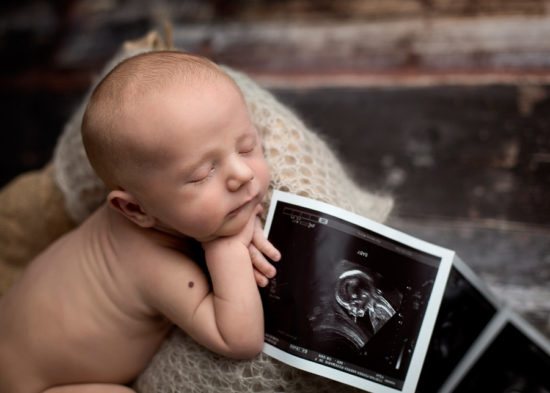
At 17 weeks, a planned study is usually not prescribed. According to the plan, the diagnosis takes place at 18 weeks. A specialist may refer a pregnant woman at 17 weeks for an ultrasound examination in the following cases:
- Failed diagnosis at 12 weeks (first trimester).
- The expectant mother has serious chronic diseases.
- Exposure of pregnant women to acute infectious diseases.
- Unsatisfactory biochemical screening of the first/second trimester (deviation from the norm of indicators such as: PAPP, free estriol, beta-hCG, alphafetoprotein).
- The requirement of a married couple to carry out diagnostics to exclude chromosomal abnormalities and fetal malformations.
- Weakness of the cervix.
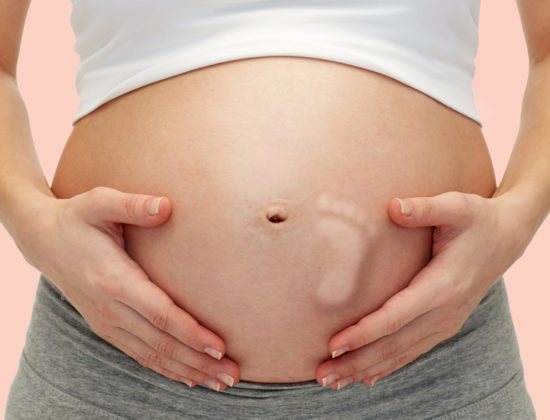
No harmful effects of ultrasound on fetal development were found. There is no need to worry again if you are prescribed an additional ultrasound examination at 17 weeks. This diagnosis will not affect your baby’s condition, but it will provide the specialist with comprehensive information about existing disorders. At this time, the following pathologies may be detected in the child:
- abruption, placenta previa;
- developmental delay;
- structural anomalies;
- fetoplacental insufficiency;
- a lot/little water;
- premature aging of the placenta;
- failure of the scar on the uterus, which remained after a previous operation (cesarean section).
Timely identification of such pathologies can be decisive in maintaining pregnancy. Be sure to go through all the tests that your gynecologist directs you to do. Thanks to a thorough examination of the condition of the fetus and the mother’s reproductive organs, a specialist will help solve all problems that arise during pregnancy as soon as possible.
Pregnancy after IVF
In vitro fertilization of an egg and subsequent pregnancy require a woman to be very careful about the slightest changes in her well-being. High doses of hormones during preparation for IVF can disrupt the endocrine status of the pregnant woman, so it needs to be closely monitored by conducting additional studies.
Hormonal therapy in preparation for artificial insemination leads to disruption of hemostasis (blood circulation), which already carries an additional burden. Women who become pregnant through IVF most often have a history of complications of gynecological diseases, which further increases the risk of miscarriage. During such a pregnancy, an ultrasound is often performed, hormone levels are measured, and the development of the unborn baby is screened.
Painful sensations
The threat of spontaneous abortion at this stage is low, and the sensations from stretching the uterine ligaments come first. The nature of the pain can be aching or “shooting” with a rapid change in body position, its intensity ranges from minor to severe sensations similar to pain during menstruation. The best tactic is to wear a prenatal bandage that supports the uterus, rest more often, and do not make sudden movements.
Pain in the tailbone and in other parts of the spine may be due to the fact that the weight and volume of the uterus have increased, and the load on the spinal column has increased. In this case, swimming, water aerobics, and feasible physical education exercises for pregnant women will help.
Feelings and signs
There are still certain symptoms. If the pregnant woman’s condition causes concern, it is recommended to immediately seek medical help. What unusual sensations may occur:
- I want to go to the toilet more often. This is explained by the significant parameters of the uterus - during growth it puts pressure on the bladder, causing the urge to urinate frequently. This is not necessary, each woman’s body is individual;
- candidiasis (thrush) may increase. Chronic appearance throughout gestation is not uncommon. The disease is caused by a sharp decrease in immunity. It is possible that thrush accompanied the woman even before conception, with different dynamics: there were exacerbations and disappearance of complaints as such. If chronic candidiasis begins to bother a pregnant woman (unpleasant discharge, itching), it is worth visiting a women's clinic. Interesting fact: the disease can be triggered by a large amount of sweets. However, if a woman does not have a sweet tooth, you need to pay attention to intimate hygiene – yours and your partner’s;
- vaginal discharge of unusual color and consistency. Greenish, yellowish discharge with blood clots is an alarm bell. A cheesy consistency and an unpleasant odor may indicate the initial stage of the inflammatory process. A gynecologist will help identify and eliminate the cause: take a smear for analysis and prescribe treatment according to the nature of the discharge. It is worth remembering that the norm of discharge during pregnancy is: light, of uniform consistency, with a sourish specific odor;
- metamorphosis in appearance: the face is rounded, the lips and nose may swell, and there is a blush on the cheeks. These are typical symptoms for women in an interesting position;
- During this period, you can feel the first tremors of the baby: he moves quite actively, and the enlarged tummy contributes to this. However, if there are no movements yet, there is no need to worry. 18 – 22 weeks is the optimal period for the appearance of these sensations. It is not uncommon for women during their second or third pregnancy to feel their baby’s activity much earlier;
- Unpleasant nagging pain in the lower abdomen may occur - a sign of an enlarging uterus. It feels similar to the beginning of menstruation. This can be explained by the tension of the ligaments that support the uterus. If a similar problem appears, there is no need to panic - just reduce your physical activity, no sudden movements from a lying (sitting) position, more rest. The dynamics of pain can change - from sharp to aching, it can be shooting or radiate to the lower back;
- the location of unpleasant painful sensations is the lower back, tailbone. What could it be? Most often, the problem is the load on the spine - and again the actively growing uterus. Although this is no longer easy, it is better to choose the most comfortable position for relaxation, do not lie in one place for a long time, and walk. Another taboo is lifting weights;
- the appearance of heartburn in the stomach and bloating are common symptoms of pregnant women. The growth and weight gain of the uterus provokes compression and slight deformation of some internal organs. This kind of activity is bad for the intestines, which is the reason for the above-mentioned problems. Control the amount of food, do not overeat, eat healthy food;
- increased sweating, lethargy, increased heart rate are signs of an enlarged organ of the endocrine system - the thyroid gland. Sometimes leg cramps may occur. If you take a lot of vitamins in your food (especially calcium!), this trouble can be avoided;
- Gums may bleed. And the cause of the problem is a rapid heartbeat. To get rid of the disease, it is recommended to rinse your mouth twice a day with herbal dental solutions (can be bought in pharmacies);
- sleep patterns change. This is due to the rounding of the tummy - it is difficult to find a comfortable position in which you can sleep all night. The optimally comfortable option: lie on your side, bend your knees, put a small pillow between them and your stomach. It is forbidden to sleep on your stomach! The position “on your back” is not recommended - this negatively affects the inferior vena cava.

The optimal sleeping position is on your side
Sensations (movements) at 17 weeks of pregnancy
You can feel your baby's first kicks between 16 and 22 weeks. Mothers who are not pregnant for the first time begin to feel movements earlier. These are unique moments that each describes in its own way. For some, this happened like “the flap of a moth’s wings,” while others compared it to “a light touch of a kitten’s paw.”
During this period, the load on the circulatory and cardiovascular systems increases. The kidneys are also affected. Due to the frequent urge to visit the toilet, you can develop inflammatory processes in the urinary tract.
There are frequent cases of nosebleeds and gum problems - this is explained by an increase in the amount of blood. The feeling of heat inside and lack of oxygen means only one thing - it’s time to lie down and rest. Also avoid sudden temperature changes - they lead to surges in blood pressure, which is extremely undesirable.
Features of IVF pregnancy
The course of pregnancy achieved through artificial fertilization (in vitro) is no different from normal. 17 weeks is the threshold for stabilizing the psychological state and enjoying one’s condition. The risk of miscarriage is becoming smaller every day.
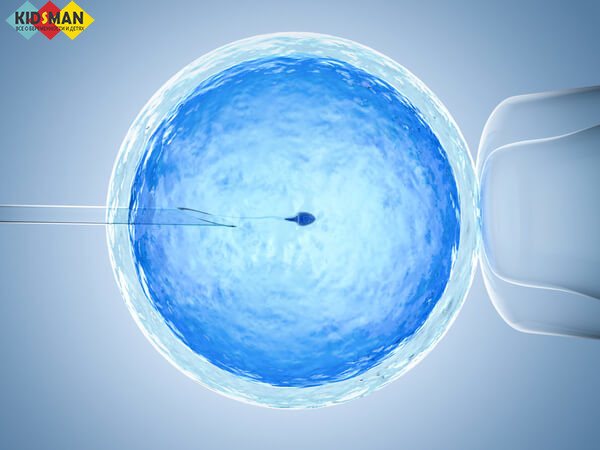
With IVF, pregnancy at this stage is no different from natural
If you are pregnant with twins
Multiple pregnancy occurs with other symptoms:
- unpleasant pain appears in the epigastric region;
- after eating a large amount of food, heartburn may occur;
- the stomach grows much faster;
- a colossal load on the spine, which only gymnastics or yoga for pregnant women can “unload”.
A medical support bandage will not hurt – it will help make you feel better and reduce the load on your back. In addition, the uterus will not put so much pressure on the bladder, and accordingly, the desire to go to the toilet will decrease. Thanks to the bandage, you can avoid the appearance of stretch marks, especially over long periods of time. Stretching of the skin is accompanied by discomfort and itching, which is unpleasant for a woman.
Uterus
The uterus changes in size, grows upward, and stretches out. This can provoke unpleasant sensations, sometimes even painful. They should not frighten the expectant mother if they appear infrequently.
Shortness of breath, swelling, heartburn may occur - the internal organs are forced to give way to the rapidly growing uterus. The distance of the uterus from the navel is already about 5 cm, it can be felt by palpation. The bottom of the uterine cavity rises above the pubis by 17 cm.
Stomach
The most basic rule is that your stomach should not hurt! There may be mild nagging pain and itching – signs of skin stretching. If discomfort increases, consult a doctor. The tummy at 17 weeks is noticeably rounded, but it may be different.
It all depends on the location of the fetus - if it is closer to the back wall of the uterine cavity or very low, the belly is just beginning to increase. During this period, the first movements appear, the expectant mother feels a special unity with herself and the baby.
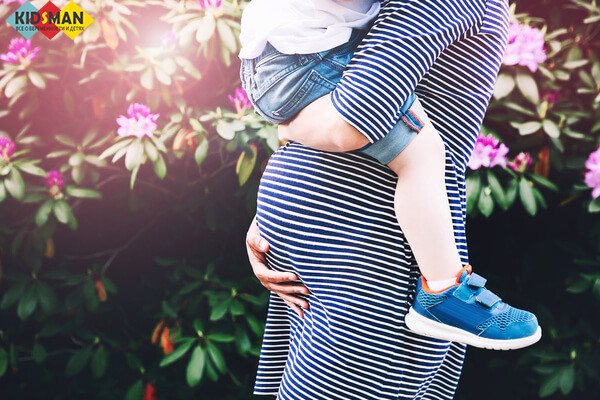
When pregnant again, a woman may feel movements before 17 weeks.
Pain
Doctors strongly recommend that a woman not make sudden movements - this can cause shooting or nagging pain in the lower abdomen. The load on the back increases, the skin stretches - the reason for this is the growing uterus. Unpleasant sensations may occur in different locations: lower back, tailbone. If the condition worsens, it is better to lie down.
Colds and fever
How can you treat colds during pregnancy? Why can’t such a state of a woman’s body be allowed to occur? The first trimester is especially dangerous - even the slightest cold can provoke a miscarriage or placental abruption.
If the disease is accompanied by elevated body temperature, the risk increases significantly. 17 weeks is a kind of threshold, after crossing which you can worry less, but you should not trigger the current disease. Several recommendations regarding what a pregnant woman should do in such a case:
- If your body temperature is elevated, use rubdowns. You need to drink a lot; during a fever, the body becomes dehydrated. If the thermometer says oh, take paracetamol;
- effective folk methods in this case: teas with herbs (melissa, chamomile), gargling, inhalations. Taking medications orally is possible only after consultation with the doctor;
- calmness, bed rest will help you gain strength, and regular airing of the room will ease the symptoms of a runny nose;
- If complications of the condition are noticeable, do not hesitate, call a doctor!
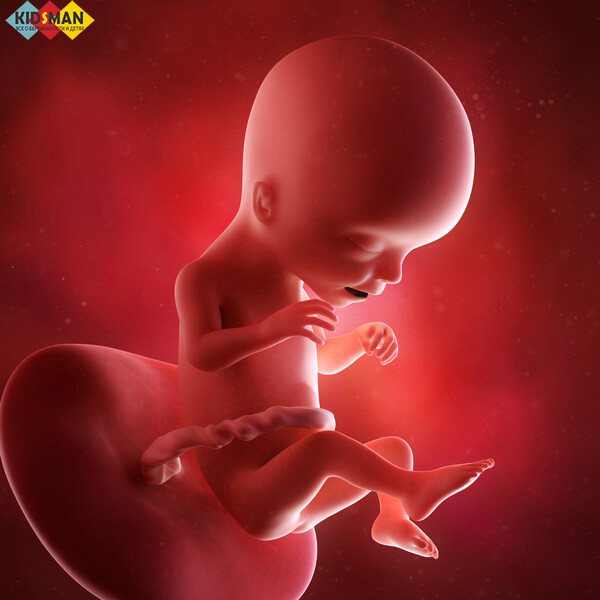
It is important to notice signs of complications in time so as not to lose the fetus
A baby at 17 weeks has a natural barrier - the placenta. Another factor is the well-developed immunity by this time, which “blocks” viruses.
Medicines and medical procedures
No matter the severity of the disease: a common cold or the flu, you cannot treat yourself! Many medications are prohibited during gestation, this is fraught with unpleasant consequences.
Discharge at 17 weeks of pregnancy
The discharge is normal: light, without a strong odor, uniform consistency. If unpleasant-smelling, greyish, greenish or other unusual shade of leucorrhoea appears, this is a good reason to consult a doctor.
A curdled consistency or flakes may indicate a disease of the genital tract or an exacerbation of candidiasis. Nagging pain in the lower abdomen, as well as reddish or brown discharge, often indicate a threat of spontaneous miscarriage.
In any case, it is better to let the gynecologist clarify the cause and nature of the discharge.
Frozen pregnancy
What could be the reasons for fetal death at the beginning of the fifth month of pregnancy? Unfortunately, statistics show that miscarriage or spontaneous abortion can happen at any stage. One of the common causes is infectious diseases.
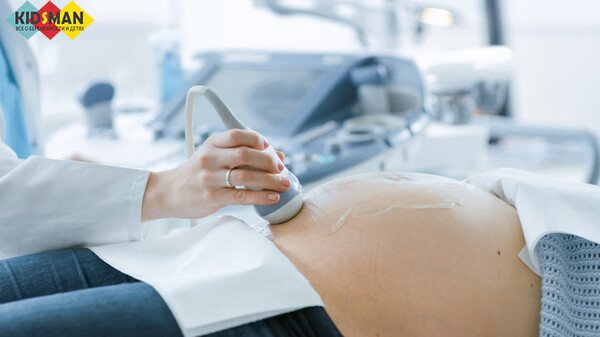
Frozen pregnancy is diagnosed by ultrasound
It is not difficult to determine a frozen pregnancy: there is no heartbeat on ultrasound, the fetus does not show activity. In addition, the size of the uterus does not correspond to the required parameters at this stage. Bloody vaginal discharge is another alarm bell.
Analyzes
A special procedure – screening – can detect a frozen pregnancy. There can be many reasons, among them – abnormalities of fetal chromosomes. At 17 weeks, a mandatory “triple test” is performed - 2nd trimester screening. What is included in the procedure:
- blood is drawn for AFP (α - fetoprotein);
- general analysis for hCG levels;
- sampling for free estriol levels;
- Ultrasound examination.
All procedures are carried out in a comprehensive manner, giving an objective assessment of the presence of developmental anomalies. Risk assessment is a general figure after the results of all studies. Evaluation criteria: completed screening, height and weight of the pregnant woman, age. The characteristics of the course of pregnancy, the state of health of the mother and fetus, and other things are also taken into account.
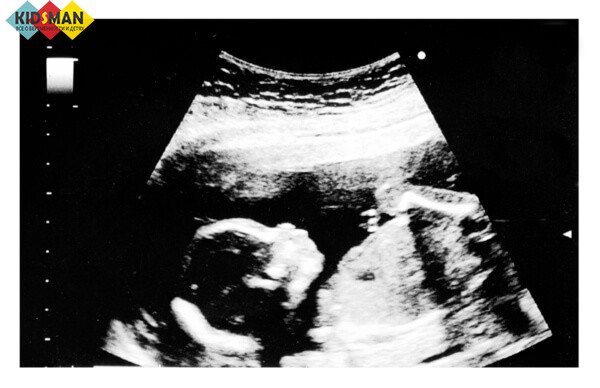
The ultrasound photo clearly shows that the fetus already resembles a newborn
Ultrasound
At this time, you can already find out exactly the gender of your baby. This is a pleasant bonus to many indicators that an uzologist primarily pays attention to:
- uterine parameters;
- height and weight of the child;
- condition of the uterine myometrium;
- quantity and condition of amniotic fluid;
- the child’s activity, the dynamics of his movements;
- heartbeat indicators.
All parameters must comply with the deadlines. The doctor carefully examines the uterus using an apparatus for gross pathologies or congenital defects of the fetus.
Alcohol at 17 weeks
Alcohol should not be consumed throughout pregnancy. Regardless of the actual amount drunk, the entire volume goes to the baby: you will “drink” a glass of wine with your child. Why is this dangerous? Intoxication, poisoning of the baby’s blood, and in addition, alcohol can provoke spasms in the umbilical cord and blood vessels. This is fraught with the occurrence of oxygen starvation of the belly.
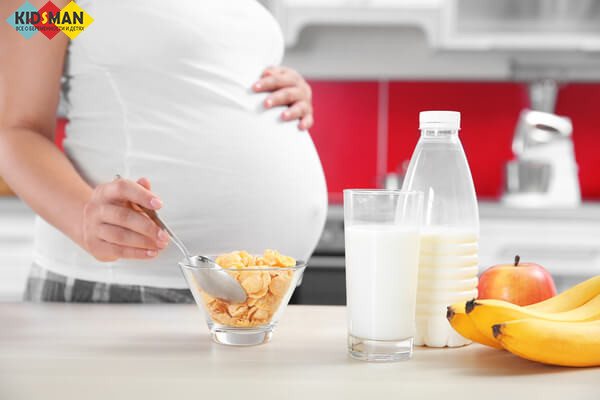
A pregnant woman's diet should consist exclusively of healthy foods.
Scientists from Britain have concluded that a tablespoon of red wine can increase hemoglobin and will not harm the child’s health. Interesting fact: taking this “medicine” is allowed precisely from the 17th week.
However, not everyone is so sure of the benefits of these methods - many doctors are categorically against drinking alcohol in any dose. Another thing is non-alcoholic wine. Ethyl is completely removed from a glass of regular red strong drink.
Weight
According to normal indicators, a woman gains about 300 grams every week. From the very beginning of the 17th week, the average weight gain is up to 3.5 kg. But it is worth remembering that everything is individual - some pregnant women gain much more and safely give birth to a healthy child.
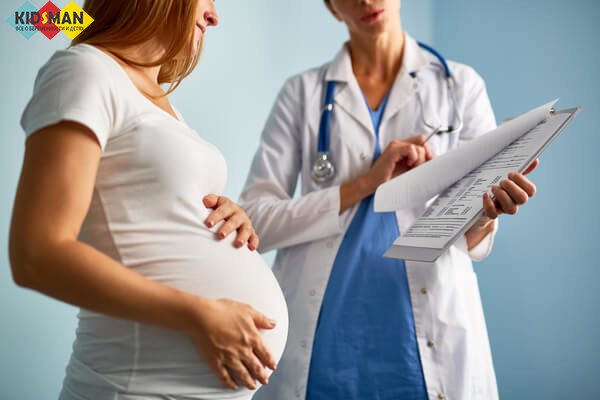
At the appointment, the doctor will weigh the expectant mother and talk about weight gain norms.
Body weight can depend on the woman’s weight before pregnancy (very rarely those prone to obesity lose kilograms), the heredity factor, the course of gestation from the very first stages, etc.
Vaginal discharge
Light translucent discharge of a small volume, with a slight sourish odor, is the norm at 17 weeks of pregnancy. The addition of pus, mucus, flakes, curdled clots, a change in color from white to yellow or green are signs of vaginal infection or candidiasis. During pregnancy, local immunity suffers, so inflammatory pathologies appear more often than usual. Any change in the nature of vaginal discharge is a reason to visit a doctor and get a smear for urogenital infections.
Candidiasis (thrush) often accompanies pregnancy, manifested by burning and itching in the vagina, hyperemia of the mucous membrane of the external genitalia and cheesy discharge. Normally, the fungus of the genus Candida is always present in the female intimate microflora in small quantities. The onset of pregnancy is the reason for its rapid growth. For candidiasis, both sexual partners must be treated, otherwise relapses of the disease are inevitable.
Visiting an obstetrician-gynecologist

Visit to the doctor at 17 weeks of pregnancy
A visit to a gynecologist at the 17th week of pregnancy is usually not scheduled if the examination took place last week.
But it is quite possible if the previous meeting took place in the 15th week.
Before taking it, you must take a urine and blood test. The directions were issued last time.
At the appointment, the doctor will ask the woman about her health, measure blood pressure, body temperature, and heart rate.
Use a meter to measure the volume of the abdomen, and listen to the fetal heartbeat with a stethoscope.
A chairside inspection will be performed.
At the end of the appointment, the doctor will set a date for re-screening (ultrasound and triple test).
Usually, in the absence of complaints, screening is scheduled for 18–20 weeks of pregnancy.
The next appointment will be scheduled after all the tests, and directions for urine and blood tests will be issued.
Ultrasound and tests
At the 17th obstetric week of pregnancy, if necessary, a 2nd screening can be performed.
It consists of an ultrasound and a triple test.
During the ultrasound, the doctor will examine:
- fetal condition: presence, condition of all major organs and systems;
- measure the length and weight of the unborn child;
- assess the condition of the uterus and amniotic sac;
- If the baby turns the right way, the doctor will be able to determine the gender.
The main purpose of the second screening is to identify possible malformations and complications that may interfere with the favorable development of pregnancy.
If the test result is not normal, the woman may be offered additional invasive tests or an ultrasound scan repeated after 2 weeks.
Triple test
The triple test is a blood test from a vein that measures:
- pregnancy hormone (hCG);
- alpha-fetoprotein protein;
- estriol.
Based on the results of this analysis, specialists can calculate the likelihood of congenital diseases and defects in the unborn child.
It is important not to try to decipher the results without consulting a gynecologist.
First of all, this is necessary to maintain calm.
Without the proper experience and knowledge, a woman can evaluate the results incorrectly and experience severe stress. During pregnancy, it is advisable to avoid such situations.
Even if the result reveals the possibility of a birth defect or disease, this is not 100% proof that this will be the case.
If the results are bad, the doctor will prescribe additional tests and only based on them can one judge reliably.
Uterus and belly
The uterus continues its systematic growth. this week its bottom is 3.5 cm from the navel.
Following the uterus, the abdomen also enlarges.
In multiparous women at the current stage, it is already clearly visible and is difficult to hide under clothing.
In first-time mothers, it is still small, but already noticeable.
Pain in the abdomen and other parts of the body
At the 17th obstetric week of pregnancy, a woman may experience pain in different parts of the body.
Stomach ache
Most often in the current period they are caused by the tone of the uterus.
If, along with pain, a woman notices hardening of the abdomen, then it is necessary to consult a gynecologist.
It may be necessary to take medicine to relax the muscles of the uterus.
If the pain is very severe, and the woman experiences a temperature rise above 37.5 degrees Celsius, red or brown discharge mixed with pus, it is necessary to urgently seek medical help.
Back pain
At the 17th obstetric week of pregnancy, many women may experience back pain.
Most often they are caused by overwork or uterine tone.
But, if the pain is localized on the sides, you should definitely tell the gynecologist about it, perhaps this is how the kidneys report problems.
Leg pain
Pain in the legs during the current period can be caused by various reasons: lack of vitamins, swelling, varicose veins.
Diagnosis should be carried out by a gynecologist. Be sure to tell him about the unpleasant sensations at your next appointment.
Before this, it is advisable to lie down more often with your legs raised high, reduce the amount of salt consumed to a minimum, and engage in permitted sports (swimming, walking).
Discharge
Normally, at the 17th obstetric week of pregnancy, the discharge should be light or milky in color, with a slight sour odor.
If a woman notices that the discharge has become watery, she needs to tell the gynecologist about it.
You need to see a doctor if the discharge:
- changed color: became yellow, green, red or brown.
- a sharp unpleasant odor appeared;
- The consistency of the discharge resembles cottage cheese or cereal.
Bleeding and menstruation
Normally, there should be no bleeding or menstruation during the current period.
If any bleeding occurs, you should immediately seek medical help.
Taking vitamins and medications
Cramps in the limbs, brittle hair and nails, unusual taste preferences are possible symptoms of vitamin deficiency and mineral deficiency. Your gynecologist will recommend special complexes for pregnant women. To compensate for the deficiency of essential substances, you need to diversify your diet with vegetables, fruits, and berries. Additionally, you should take Iodomarin or Iodine-active to support the functioning of the thyroid gland.
Any medications during pregnancy are taken only if absolutely necessary and in consultation with your doctor. There is a very small number of pharmaceuticals approved for expectant mothers. When treating somatic diseases, the attending physician must know about the patient’s pregnancy.
Intimate relationships
A woman’s sexuality does not disappear during pregnancy; on the contrary, hormonal changes lead to increased desire. Sexual intercourse gives an emotional surge and provokes the production of endorphin, called the “hormone of joy.” Intimate relationships stimulate blood circulation in the reproductive organs and help strengthen mutual understanding between spouses.
During this period of pregnancy, the following contraindications to sex may occur:
- Placenta previa;
- Risk of miscarriage;
- Infections, inflammatory diseases of the genital organs of both spouses.
The appearance of pain and bleeding is a reason to stop sexual intercourse and consult a doctor.
Nutrition at 17 weeks
The main requirements for a pregnant woman’s diet are high-quality foods rich in nutrients and their balanced inclusion in the menu. The more varied the dishes that come to a pregnant woman’s table, the easier it is to provide the fetus with material for the formation of organs and tissues.
Diet: frequent meals in small portions. To avoid stagnation in the digestive system (heartburn, constipation, flatulence, bloating), after eating you need to take a walk in the fresh air and move around.
Recommended products and dishes:
- Soups and jellies to prevent heartburn;
- Fermented milk products, cheese, cottage cheese as a source of calcium;
- Foods containing large amounts of iron for the production of oxygen-carrying red blood cells in the blood (liver, beef, pomegranate juice, apples).
You should not overuse fatty and fried foods, pickles and smoked meats, which provoke increased secretion of gastric juice.
Recommendations for the expectant mother
Expert advice for the well-being of a pregnant woman:
- if pain occurs, it is better to call a doctor at home. Take any strange or alarming symptoms seriously;
- control your sleeping position - the “stomach” and “back” positions can harm the baby;
- say firmly “no!” self-medication;
- avoid noisy events: in addition to stress in the baby, you can catch the virus;
- Be examined by specialists of a narrow profile: an ophthalmologist, a surgeon, a cardiologist. During pregnancy, manifestations of varicose veins, hemorrhoids, and arrhythmia are common;
- It is advisable to protect yourself as much as possible from collisions, blows, bruises or falls.
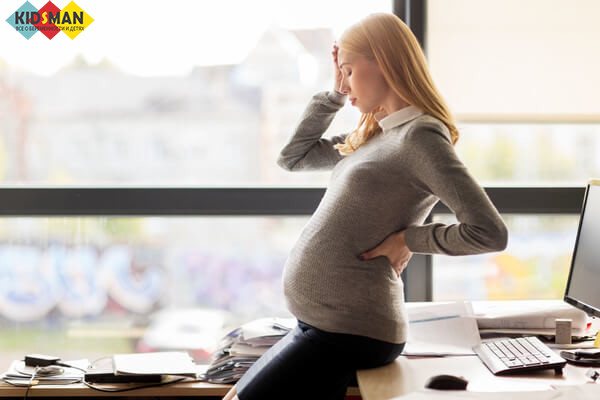
During pregnancy, you should avoid stress at all costs.
Nutritional Features
You need to eat only healthy foods and exclude harmful foods. Nutrition should be balanced, food should be fresh and of high quality, ideally prepared at home. Remember that your baby eats with you too! It is recommended to eat small portions throughout the day. Optimally – 5 times.
It is not advisable to overeat; heartburn or indigestion may occur. When creating your menu, take into account the baby’s needs - eat more calcium and vitamins. To avoid problems with absorption and disruptions in the digestive system, after eating it is better to take a short walk or just move around.
What should be excluded completely or significantly reduced in quantity for a period of 17 weeks:
- avoid spicy foods and dishes;
- too salty;
- smoked meats;
- minimize the usual dose of tea and coffee;
- No fried or fatty foods.
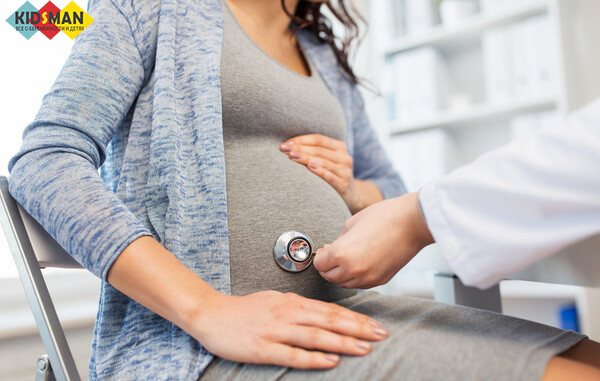
Proper nutrition and a healthy lifestyle will certainly have a positive effect on the course of pregnancy
Remove sour foods from your diet, especially berries. Add more grains, fresh fruits and vegetables, and dairy products. Eat first courses - they coat the stomach, preventing the formation of heartburn. To avoid anemia, include foods containing iron in your diet (buckwheat, liver, pomegranate). Vitamin D is another important component in the fight against hypertension.
Physical activity
If you want to safely carry and easily give birth to your long-awaited baby, move on. Not from the kitchen to the sofa, no. An excellent solution at week 17 would be to go to the gym, where a qualified trainer will conduct a lesson specially designed for pregnant women.
If you don’t have such a desire, just walk more in the fresh air. What gynecologists recommend to their patients:
- water aerobics in the program for pregnant women - active exercises in the pool, safe and completely under the control of a trainer. Swimming is a great alternative;
- yoga for pregnant women – thanks to a specially designed course, a safe and healthy procedure. With its help, breathing is trained, the nervous system is calmed, and the muscles of the whole body are strengthened. Tightness and tone appear. This is one of the most popular activities among new mothers;
- light fitness and aerobics. The main thing is to be careful with the loads!

You can and should attend sports classes for pregnant women
What symptoms do you need to stop exercising: breathing problems, unpleasant pain or discomfort.
Consult your doctor and start exercising at a moderate pace.
Vitamins
Throughout the entire gestation period, it is important and necessary for the expectant mother to take vitamin complexes. Such supplements contain all the nutritional elements necessary for the growth and development of the baby. What microelements and vitamins are included in the complex:
- Groups A, B, C, D, K, N, E;
- folic acid;
- iodine;
- magnesium;
- selenium;
- iron;
- zinc;
- calcium.
The above substances will help a pregnant woman normalize her well-being and not get vitamin deficiency, and help the child lay a strong foundation for development. Basic vitamins and minerals should be supplied through food: eat more fresh vegetables and fruits, herbs, and seafood.
Sex
Second trimester and sex life: is it possible or not? The answer is different for each couple. Physiologically, there will be no damage to the unborn child from such a process.
Many couples fear complications due to a significantly larger belly: these fears have no serious basis. During sexual intercourse, the hormone of joy - endorphin - is released into the blood, which improves not only the condition of the mother, but also the unborn child.

An emotional connection with dad will give a good mood to both mother and child
In addition, during sex, the woman's internal muscles are stimulated and massaged. At week 17, the sensitivity of many places is increased, which can give partners an unforgettable experience.
However, there are cautions: if the pregnancy is in danger or the woman has other ailments, it is better to abstain from intimacy for a while.
A special problem is frozen pregnancy
Cessation of fetal development can occur for various reasons. Among them are hormonal imbalance, Rh conflict between mother and child, and the consequences of infection. The body may not immediately begin to reject the fertilized egg; first, the pregnancy fades. This condition is sometimes not accompanied by any symptoms, but during the next examination, the obstetrician-gynecologist will definitely diagnose the problem.
Symptoms:
- Lack of fetal movements;
- Temperature increase;
- Bloody or bloody discharge;
- No signs of pregnancy (toxicosis, breast swelling);
- Pain in the lower abdomen and lower back.
A frozen pregnancy is terminated in a hospital setting, the woman is prescribed a course of anti-inflammatory drugs and procedures, and is offered psychological assistance.
